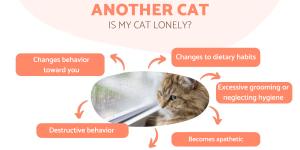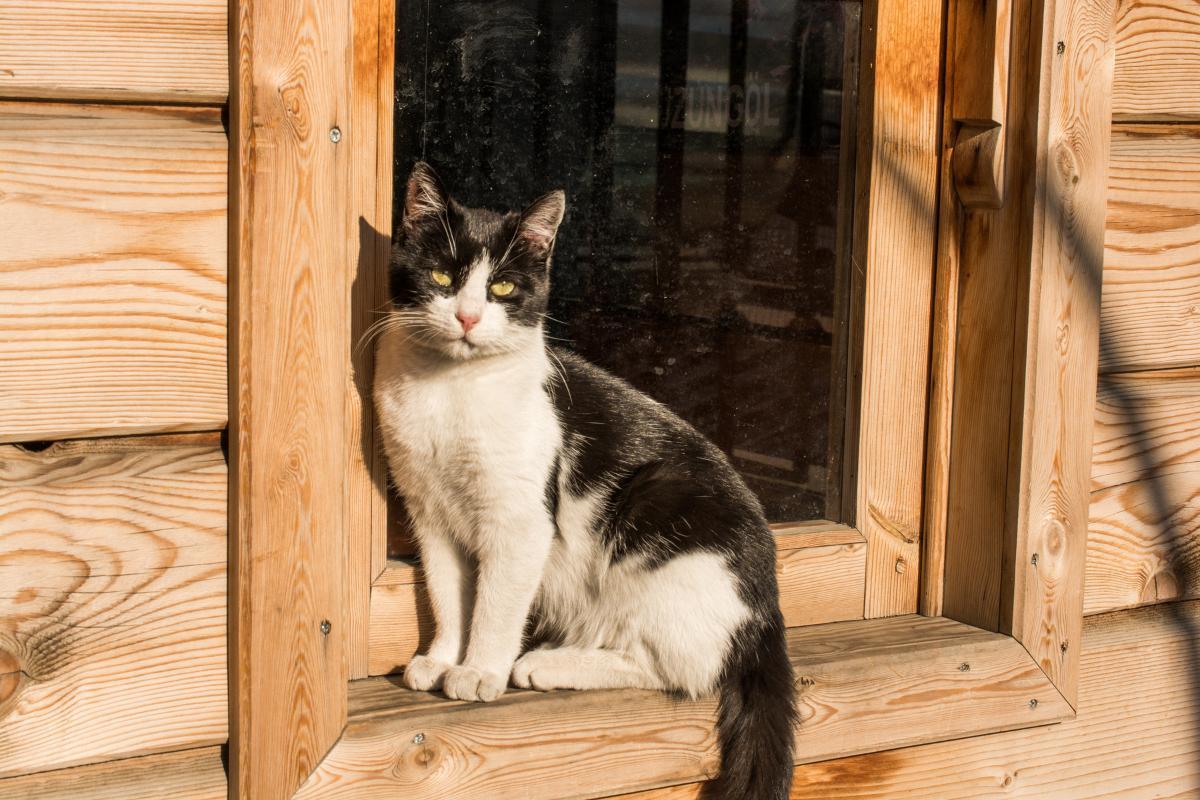My Indoor Cat Wants to Go Outside



See files for Cats
Keeping a cat indoors is an important method of protection for many felines, especially when living in a built-up area such as a city. There are many dangers outside which can cause harm to the animal. There is also the risk of becoming lost and adding their number to the surfeit of stray cats which are in need of protection. Cats in densely populated areas can have access to outdoors and live happy lives, but outdoor cats tend to fare better when they live in quieter areas where they can roam in relative safety. However, this roaming can be problematic for other fauna and humans nearby.
With this context in mind, AnimalWised discovers what to do when my indoor cat wants to go outside. We determine whether it is a good idea to let a cat outside, such as by neutering them. We also find out what we can do to keep a cat indoors and be happy at the same time.
Why should you keep a cat indoors?
Some guardians think it is cruel to keep a cat indoors. Their feline may stare out the window for large parts of the day in what seems to be pining for the outside world. While felines do naturally want to explore, they don't necessarily want to stray too far from their home comforts. How much a cat wants to go outside will depend on the individual, with many cats being very happy being the monarch of their own kingdom.
Although some cats will want to go outside of their own accord, there are some important reasons why it is not a good idea:
- Safety: if a cat does not have access to the outside, they are safe from various dangers. This includes fighting with other cats, being attacked by local predators, becoming stuck somewhere they cannot get out, falling from height or many other potentially harmful situations.
- Health: another significant danger is the possibility of contracting a deadly disease. Viruses, bacterial infections and parasitic infestations are some of the dangers caused by pathogenic organisms which are in a greater proliferation outdoors[1]. They also have a greater risk of being infected by another animal.
- Monitoring: the care we provide for our cats can be better carried out if they are indoors. We can better create a routine for them and ensure they are well fed. Outdoor cats may go to other households and receive poor quality or too great a quantity of food. This makes it more difficult to monitor a cat's well-being, especially if they have issues such as obesity or food intolerances.
- Unwanted pregnancy: if your cat is sexually intact, allowing them outdoors can lead to unwanted pregnancy. Males can impregnate stray, feral and other female cats. Females can become impregnated and you will have to both nurture her through pregnancy and provide for the kittens once they are born.
- Environmental issues: while it is a contentious issue, there is evidence to suggest that the rise in domestic and feral feline populations is having a deleterious effect on local wildlife populations, especially birds. Keeping an indoor cat can allow the cat to have a healthy life without decreasing vulnerable animal populations.
Despite these benefits, many guardians prefer to let their cat have access to the outside. This is often because of behavioral problems which some cats develop when they are denied the ability to go outdoors. However, the reasons for this behavior can be incredibly varied.
Does neutering a cat stop them wanting to go outside?
One of the specific dangers of having outdoor access has not yet been addressed. This is the issue of escape. Cats that are sexually intact will have a very strong reproductive drive which will lead to try to find a mate. For female cats, going into the heat cycle will lead them to release pheromones and call out for a male. Male cats will release their own pheromones to both alert females to their presence and warn rival males to stay away.
The reproductive urge in domestic cats results in roaming behavior. When the drive to copulate is so strong, it can even lead cats to become lost. Fighting often breaks out between rival males and females won't rest until they mating occurs. It means that indoor cats that are sexually intact will often have a very strong drive to go outside
In addition to other benefits, neutering can help reduce or completely eliminate roaming behavior. Since the cats do not have an impetus to mate, they are less likely to escape, become lost or fight with other cats. Successful spaying of females also means they will not become pregnant.
However, despite neutering removing the cat's urge to mate, it does not stop them from being curious and territorial. For this reason, some neutered cats may still want to go outside. It is also important to know that neutering is only one factor. Each cat is an individual and may have a greater desire to go out for reasons unrelated to reproduction. This could be as basic as personal preference.

Why does my neutered cat want to go outside?
Although neutering can reduce a desire to go outside, there are other reasons a cats want to roam. This is regardless of whether they are neutered. These reasons a neutered cat wants to go outside include:
- Curiosity: cats are known for being curious animals. Even indoors, they will want to investigate anything that takes their fancy, especially if they think it might be another living thing. This is related to a cat's hunting instinct, but they will also want to explore to see if there is any fun, to guard against potential danger or any number of unknown reasons.
- Territoriality: cats are very territorial animals. Although neutering reduces marking behavior significantly, it doesn't mean they won't want stop being territorial altogether. They still want to protect their home and show other cats they will defend themselves. Especially if an indoor cat sees cats outside, they may want to scare them off.
- Play: cats love to play, something which may lessen as they age, but which usually stays to some degree. If they see movement and life outside, they may have a strong desire to go out any play.
- Breed: while it is only one factor in a desire to roam, it is true that certain breeds have a greater predisposition to be either outdoor or indoor cats. Certain breeds such as the Norwegian Forest Cat and Maine Coon tend to have a greater drive to go outside. Breeds like the Sphynx and Siamese cats often prefer staying closer to home.
- Boredom: one of the most important reasons a cat wants to go outside is boredom. This is regardless if they are neutered. The outside world has many natural distractions and options for play. This desire to explore will be greater if their life indoors lacks enrichment and options for both physical and cognitive stimulation. The amount of stimulation and variety they require will also depend on the individual.
What to do if my indoor cat wants to go outside?
For many guardians, it can seem cruel to prevent their cat doing something they want to do which is part of their natural instinct. Even with the dangers detailed above, they may believe the happiness they will experience when they have outdoor access will be more important. This is an option, but it is not always the best one for your cat. You should consider the following if you are thinking of letting your indoor cat outside:
- Neutering: regardless of whether you have an outdoor cat or an indoor cat, neutering is the best option. Many states will legally require neutering if you let them outdoors. This prevents fights with other cats, reduces the risk of getting lost, protects them from certain diseases and stops unwanted pregnancies. The benefits of neutering a cat also apply to indoors cats, especially in terms of behavioral problems and health.
- Let them out: if you have neutered your cat and assessed the potential dangers, it may be an option to let them out. If you live in a quiet area and you believe their environmental impact is minimal, letting the cat have the ability to roam can help them stabilize and avoid behavioral problems.
- Create a catio: in many cases, letting the cat outdoors will simply not be possible. We may be able to help them by creating a catio. This is an enclosed space outside which allows the cat to play in a protected environment. Putting up netting and other barriers protects the cat escaping and others entering, but also gives them fresh air, more space to play and heightened sensory experiences.
- Take them for a walk: this is not a good option for all cats, but some cats may enjoy being walked on a leash. Using a harness, we can take the cat for supervised outings which allows them to experience the outdoors with much less risk of escape. In some cases, it may make the cat want to go out more and many won't tolerate a leash and harness.
- Provide a playmate: in some cases, adopting another animal into the home might solve the issue of an indoor cat wanting to go outside. This might be a new cat, but it could also be another animal such as a dog. However, the cat's personality can vary greatly and some may have even greater a desire to go outside if there is another animal in the home.
- Environmental enrichment: one of the most important factors for any feline is environmental enrichment for cats. This will allow them to exercise their instincts while also stimulating them physically and mentally. Some cats will need more stimulation than others, but providing toys and accessories, as well as simply spending time with them, will be important for any cat.

How long does it take a neutered cat to stop wanting to go outside?
As we have explained, sterilization can help reduce or eliminate a cat's desire to go outside. If you do decide to neuter your cat, this will mean castration for male cats and spaying (also known as an ovariohysterectomy) for females. These procedures remove the sexual organs and means the cat will lose their reproductive desires.
The neutering procedure is safe and doesn't usually require a long time for recovery. It does require a general anesthetic, so your cat will be unconscious for some hours immediately post-surgery. However, they will likely be able to leave on the same day.
Once at home, we will need to protect the cat. This means keeping them in a quiet and safe place while minimizing interactions. They may need an e-collar to prevent them opening the sutures. Generally speaking, the full recovery process usually takes up to around 14 days. After this time, we will likely see the cat has a decreased desire to go outside. If not, you will need to address the other issues raised above.
Although a cat loses the sexual urge after sterilization, they may still enact some related behaviors. Learn more with our article on why my neutered cat still humps.

If you want to read similar articles to My Indoor Cat Wants to Go Outside, we recommend you visit our Basic care category.
1. Tan, S. M. L., Stellato, A. C., & Niel, L. (2020). Uncontrolled Outdoor Access for Cats: An Assessment of Risks and Benefits. Animals: an open access journal from MDPI, 10(2), 258. https://doi.org/10.3390/ani10020258
- Machado, JC, Ferreira, GA, & Genaro, G. (2018). Castration and bem-estar feline. Revista Brasileira de Zoociências, 19(2).
- Feline Behavior, Ideas and Practice. Ceva. Retrieved from: https://wp.ufpel.edu.br/direitosdosanimais/files/2020/10/apostila_gatos_digital_ceva.pdf. Access on 08/28/2023.







